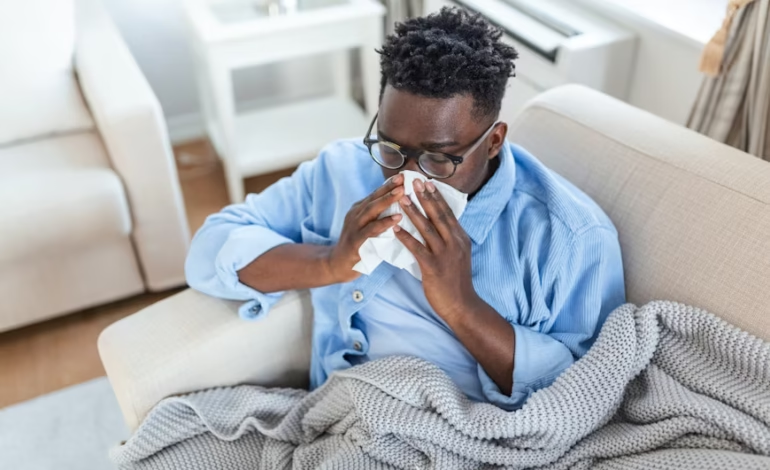Flu: How Long It Lasts, Common Symptoms, and When to See a Doctor
Each year, as fall and winter arrive, so does flu season — and for many of us, that means sudden fatigue, a sore throat, and wondering if we need to

Each year, as fall and winter arrive, so does flu season — and for many of us, that means sudden fatigue, a sore throat, and wondering if we need to cancel everything for a week. I’ve been hit by the flu more than once, and every time I ask myself: How long is this going to last, and what can I take to feel better?
This article covers the most important facts you need to know about the flu: how long it sticks around, what symptoms to expect, when to get medical help, and what over-the-counter medications actually work.
What Is the Flu?
The flu, or influenza, is a highly contagious respiratory illness caused by influenza viruses. It typically spreads through airborne droplets when someone coughs, sneezes, or talks.
It’s more intense than the common cold and can lead to serious complications, especially in older adults, young children, and people with chronic health conditions. Early flu treatment with rest, hydration, and proper medication can help reduce symptoms and speed up recovery.

What are the Common Symptoms of Flu?
Flu symptoms usually come on suddenly and can include:
- Fever or chills
- Cough (usually dry)
- Sore throat
- Muscle or body aches
- Fatigue
- Headaches
- Runny or stuffy nose
- Loss of appetite
- Nausea or vomiting (more common in children)
“Unlike a cold, flu symptoms tend to hit quickly and hard. Fever and body aches are telltale signs,” says Dr. Natalie Rios, a family physician in Chicago.
How Long Does the Flu Last?
For most healthy people, the flu lasts between 5 to 7 days.
Here’s a general timeline:
- Day 1–3: Symptoms start abruptly — fever, chills, sore throat, body aches
- Day 4–5: Fever may break, but fatigue and coughing persist
- Day 6–7: Most symptoms improve, but lingering fatigue and dry cough may continue
Children, older adults, and people with weakened immune systems may experience symptoms for longer — up to 10 days or more.
When to See a Doctor for the Flu
Most people recover from the flu at home, but medical attention is needed if you or a loved one shows the following warning signs:
Adults:
- Trouble breathing or shortness of breath
- Chest pain or pressure
- Dizziness or confusion
- Severe or persistent vomiting
- Symptoms that improve, then return with fever and worse cough
Children:
- Fast or troubled breathing
- Not drinking enough fluids
- Bluish lips or face
- Extreme irritability or drowsiness
- No waking or interaction
If you’re in a high-risk group (65+, pregnant, immunocompromised, or have chronic conditions like asthma or diabetes), it’s best to consult your doctor early, especially within the first 48 hours.
What Over-the-Counter Medications Help Flu Symptoms?
While OTC meds won’t cure the flu, they can ease symptoms and help you rest:
For Fever and Aches:
- Acetaminophen (Tylenol)
- Ibuprofen (Advil, Motrin)
(Avoid giving aspirin to children due to risk of Reye’s syndrome)
For Nasal Congestion:
- Pseudoephedrine (Sudafed) – effective but may raise blood pressure
- Nasal sprays (like oxymetazoline) – limit use to 3 days to prevent rebound congestion
For Cough:
- Dextromethorphan – suppresses dry cough
- Guaifenesin – loosens mucus in wet coughs
For Sore Throat:
- Lozenges with menthol
- Saltwater gargle or warm tea with honey
“The key is symptom relief and rest,” says Dr. Raj Mehta, an internal medicine specialist. “Fluids, electrolytes, and over-the-counter support can make a big difference.”
Read About: Is Bronchitis, Pneumonia, or Strep Throat Contagious?
Can Antiviral Medications Help?
Yes — if taken within the first 48 hours, prescription antivirals like Tamiflu (oseltamivir) or Xofluza can reduce the severity and duration of the flu. These are especially useful for high-risk patients.
How to Recover Faster from the Flu
- Rest as much as possible
- Stay hydrated (water, broth, electrolyte drinks)
- Use a humidifier to ease breathing
- Eat light, nutritious meals
- Avoid caffeine and alcohol
Can You Prevent the Flu?
Yes. The best protection is getting a flu shot each year, ideally in early fall. It doesn’t guarantee flu prevention, but it can significantly reduce the risk and severity. If you do get sick, timely flu treatment can help manage symptoms and prevent complications.
Also:
- Wash hands frequently
- Avoid close contact with sick people
- Disinfect high-touch surfaces
- Wear a mask if you’re sick or high risk during flu season
Thoughts
The flu can knock you out for a week or more, but with the right care, most people bounce back fully. Don’t ignore your symptoms, and listen to your body. Early rest, proper hydration, and smart use of over-the-counter meds can go a long way in helping you recover. Seeking timely flu treatment ensures faster recovery and reduces the risk of serious complications.
And if you’re in a high-risk category or start to feel worse after improvement — don’t hesitate to see a doctor.








